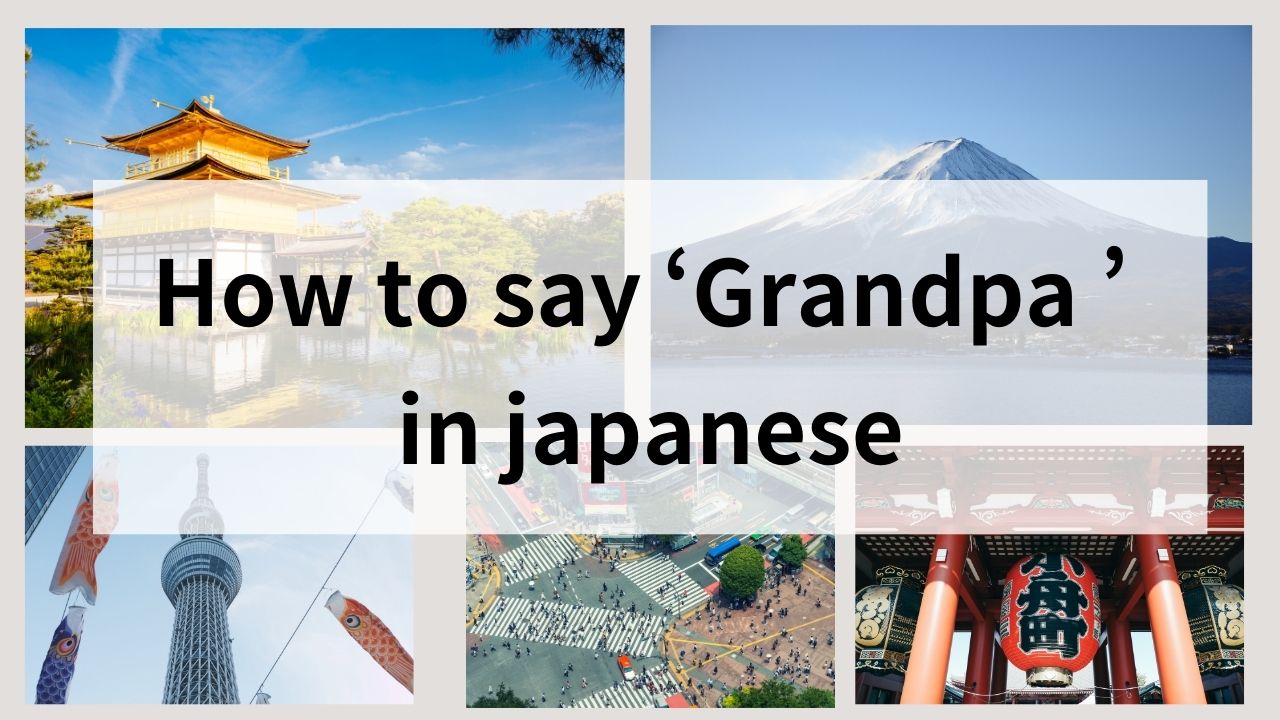Are you curious about how to say “grandpa” in Japanese? The term for grandparent carries a sense of warmth and affection in Japanese culture, reflecting the deep respect for elders. This guide will explore the Japanese word for “grandpa,” its cultural significance, and practical applications.
How Do You Say “Grandpa” in Japanese?
The Japanese word for “grandpa” is おじいさん (ojiisan). This term is commonly used in both casual and formal contexts when referring to one’s grandfather or an elderly man in a friendly manner.
The Japanese Word for Grandpa: Ojiisan (おじいさん)
“Ojiisan” is a term that conveys respect and affection. It can be used to address your own grandfather or to refer to other elderly men in your community. Here are a few examples of how “ojiisan” is used:
- おじいさんと一緒に (Ojiisan to issho ni): “Together with grandpa.”
- おじいさんの家 (Ojiisan no ie): “Grandpa’s house.”
- おじいさんを訪ねる (Ojiisan o tazuneru): “To visit grandpa.”
Kanji for Grandpa: おじいさん
The term “おじいさん” is typically written in hiragana, which is the phonetic script used for native Japanese words. However, it can also be expressed in kanji as 祖父 (sofu) when referring to one’s grandfather in a more formal context, particularly in written language or genealogical discussions.
Examples of usage include:
- 祖父と話す (Sofu to hanasu): “Talk to grandpa.”
- 祖父の思い出 (Sofu no omoide): “Memories of grandpa.”
While “おじいさん” is more commonly used in everyday language, using “祖父” can convey a more formal tone in specific contexts.
Does “Grandpa” Work in Japanese?
The English word “grandpa” is generally understood in Japan, especially among younger generations who are familiar with Western culture. However, it may not be as widely recognized among older individuals or in more traditional settings. A 5-point scale rates its comprehension as:
- Rating: 3 – Somewhat understood (40-60% of people)
If clarity is crucial, using the Japanese term おじいさん (ojiisan) is recommended. While “grandpa” may be acknowledged in certain contexts, “ojiisan” ensures effective communication.
The Cultural Significance of Grandparents in Japan
Grandparents hold a special place in Japanese society, embodying wisdom, tradition, and familial bonds. They are often seen as the keepers of family history and cultural values.
Grandparents as Cultural Guardians
In Japan, grandparents are often involved in childcare and education, passing down traditions and stories to younger generations. This role is highly valued, emphasizing the importance of familial ties and respect for elders.
Grandparents in Japanese Folklore and Family Structure
Japanese folklore often features tales of wise grandfathers who impart valuable life lessons. The structure of Japanese families traditionally includes multiple generations living together, fostering close relationships and mutual support.
These cultural elements highlight the reverence for grandparents, showcasing their vital role in maintaining familial and cultural continuity.
Differences Between Grandparents in Japan and Overseas
Yes, there can be subtle differences in how “grandpa” is perceived in Japan versus Western cultures. In Japan, grandparents are often seen as integral to family life, with a strong emphasis on respect and care. In contrast, in many Western contexts, the role of grandparents may vary, with some families choosing to live independently and others maintaining close relationships. Understanding these cultural nuances can help foster better communication and appreciation for familial roles.
Practical Applications of “Grandpa” in Japanese
Learning how “grandpa” is used in Japanese can help you navigate conversations and understand cultural references related to family.
Talking About Grandpa in Daily Conversation
Here are some examples of how “ojiisan” is used in everyday conversation:
- おじいさんは元気ですか? (Ojiisan wa genki desu ka?): “Is grandpa healthy?”
- おじいさんの話を聞く (Ojiisan no hanashi o kiku): “Listen to grandpa’s stories.”
Grandpa-Related Idioms or Expressions
While there are not many specific idioms involving “ojiisan,” the term is often associated with themes of wisdom, care, and familial love. Here are some expressions that symbolize the essence of grandparents:
- おじいさんの知恵 (Ojiisan no chie): “Grandpa’s wisdom,” referring to the valuable insights and life lessons shared by elders.
- おじいさんの思い出 (Ojiisan no omoide): “Memories of grandpa,” highlighting cherished moments and experiences.
These expressions reflect the deep cultural appreciation for grandparents in Japan, emphasizing their importance in family life and the transmission of values.
Grandparents in Japanese Cuisine or Products
Grandparents are often associated with traditional Japanese cooking, passing down recipes and culinary skills to younger generations. Here are some notable examples:
- おばあちゃんの味 (Obaachan no aji): “Grandma’s flavor,” referring to the comfort and nostalgia associated with home-cooked meals.
- 伝統的な和食 (Dentoteki na washoku): “Traditional Japanese cuisine,” often prepared with love and care by grandparents, preserving cultural heritage.
These examples highlight how grandparents contribute to the richness of Japanese culinary traditions, creating lasting memories through food.
FAQs
Here are some frequently asked questions about grandparents in Japanese culture and language.
Is Grandpa a Common Term in Japan?
Yes, “ojiisan” is a common term in Japan, often used affectionately to refer to grandfathers or elderly men.
How Do You Write “Grandpa” in Japanese?
The word “grandpa” can be written in different scripts in Japanese: hiragana and kanji. Here’s a breakdown:
- Hiragana (おじいさん, Ojiisan):
Hiragana is commonly used for everyday conversation and is easy to read, making it ideal for casual interactions. - Kanji (祖父, Sofu):
Kanji is often used in formal contexts, such as written documents or genealogical discussions, conveying a sense of respect.
Choosing which script to use depends on the tone and purpose of your communication. Understanding these variations can enhance both your written and spoken Japanese skills.
Conclusion
“Grandpa,” or “ojiisan” in Japanese, is more than just a term—it symbolizes respect, love, and the importance of family. By understanding its role in Japanese language and culture, you can deepen your appreciation for the cherished bonds between generations in Japanese society.








